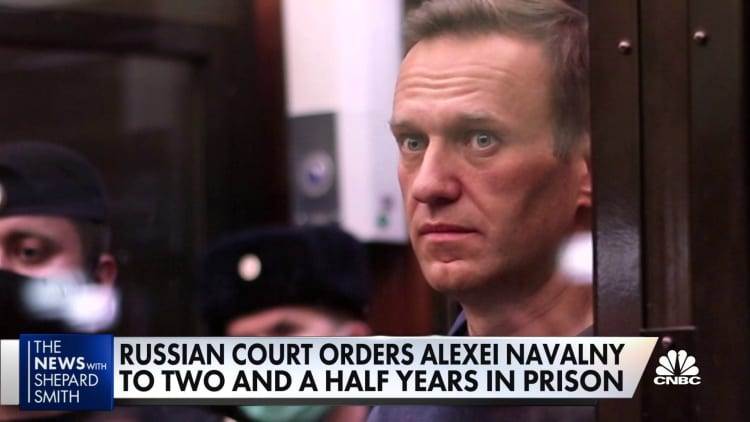WASHINGTON – The United States sanctioned seven members of the Russian government for the alleged poisoning of Kremlin critic Alexey Navalny and his subsequent arrest and detention in Moscow.
Washington also imposed sanctions on 14 entities involved in the chemical and biological industrial base in Russia, senior administration officials, who spoke on the condition of anonymity, said Tuesday.
Russia's military intelligence wing, known as the GRU, and Russia's Federal Security Service, or FSB, were sanctioned for their alleged role in the poisoning. The GosNIIOKhT, 33rd TsNIII and the 27th Scientific Center were also sanctioned for developing Russia's chemical weapons capabilities.
"The Kremlin's use of chemical weapons to silence a political opponent and intimidate others demonstrates its flagrant disregard for international norms," Treasury Secretary Janet Yellen wrote in a statement. "We join the EU in condemning Alexei Navalny's poisoning as well as his arrest and imprisonment by the Russian government," she added.
Secretary of State Antony Blinken wrote in a separate statement that the sanctions would "send a clear signal" to Russia that use of chemical weapons and human rights abuses carry hefty consequences.
"Any use of chemical weapons is unacceptable and contravenes international norms," Blinken wrote.
Navalny, a leading critic of Russian President Vladimir Putin, flew to Russia from Berlin, where he spent nearly half a year recovering for a nerve agent poisoning that took place last August. He was arrested at passport control and later sentenced to more than two years in prison.
Last summer, Navalny was medically evacuated to Germany from a Russian hospital after he became ill following reports that something was added to his tea. Russian doctors treating Navalny denied that the Kremlin critic had been poisoned and blamed his comatose state on low blood sugar levels.
In September, the German government said that the 44-year-old Russian dissident was poisoned by a chemical nerve agent, describing the toxicology report as providing "unequivocal evidence." The nerve agent was in the family of Novichok, which was developed by the Soviet Union. Toxicology tests conducted in France and Sweden also came to the same conclusion.
The Kremlin has repeatedly denied having a role in Navalny's poisoning.
At the White House, press secretary Jen Psaki said that the sanctions were coordinated with the European Union and that the Biden adminsitration "expects the relationship with Russia to continue to be a challenge."
"We are neither seeking to reset our relations with Russia nor are we seeking to escalate. There is also an ongoing process to consider a number of steps of concerning behavior taken by the Russians," Psaki added.
The sanctions are the first to target Russia since Joe Biden became president. They also come as the White House reviews other maligned Russian actions including the SolarWinds hack, reports of Russian bounties on American troops in Afghanistan and potential election interference.
The Trump administration did not take action against Russia over the Navalny situation.
The European Union first took action against Moscow for the poisoning of Navalny in October when the body announced travel restrictions and froze assets of six Russian individuals. In solidarity with the United States, the European Union announced new sanctions against Russia.
Ahead of the sanctions announcement, Kremlin spokesman Dmitry Peskov said Tuesday that the measures against Russia would further deteriorate relations between Moscow and Washington.



